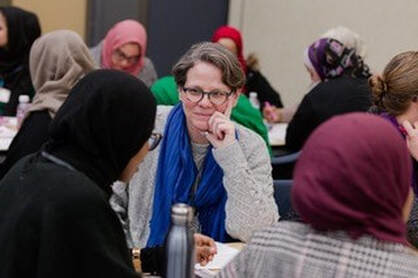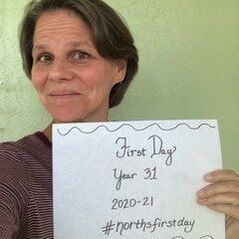|
Angela Wilcox, Beloved Community Staff Team When I was fourteen, my mother insisted that I take an “Assertiveness Training” course offered by my high school during J-term and taught by a psychologist who was a family friend. The very thought terrified me, but the great irony was that my inability to assert myself to oppose this idea meant I spent a week of January learning how to do all the things I thought I couldn’t do: make a cold phone call to ask for information; return an item of clothing; and hardest of all, enter a space where I didn’t know a single person. This week was one of the most significant in my education because of what it taught me about being human in community; Dr. Warloski gave me permission to feel uncomfortable and do the thing anyway. Her goal was to help us feel the truth that discomfort would not kill us, and that often, our paralyzing fears dissipated once we stepped over the boundary and realized that we were not alone — not in our fears, but also not in our values, beliefs, and wonder. My high school was parochial in all senses; I felt a suffocating need to get away from the sameness of that world. In college, I was surrounded by smart, curious people from all over the world. United by our academic drive and our willingness to live through Minnesota winters, we were rich in diversity of experiences, opinions, and dreams. We reveled in unveiling the quirky regionalisms that shaped us and the ways we spoke, played, and understood the world. I became aware of parts of my identity that had been hidden from me because they were so ubiquitous back home. In this temporary and carefully curated educational community, we took the time to explore our differences and share our stories. In graduate school, I gravitated toward courses and social groups filled with international students. I married one of them, we traveled the world together, and I embraced the feeling that I had finally stretched beyond the sameness of my hometown and into the world. After a decade of marriage and a divorce, what I longed for most was a spiritual home where I belonged — someplace where the values and the people felt familiar. From the first Sunday at Unity Church, everything from the religious education program to the music to the flow of the service made me feel like I was home again. And yet, Unity felt like the church of my future, where I had much in common with others, and could raise my children and myself in this new version of my life. I worked in a junior high classroom rich with diversity of all kinds — age, race, culture, language, nationality, ability, and more. As I tried to connect to my students authentically across our many differences, I was often uncomfortable, and these youth invited and pushed me into spaces that stretched me even further into discomfort. I knew from experience that discomfort wouldn’t kill me, but I learned that it takes ongoing practice to stretch and remain humble enough to stop focusing on my discomfort and start listening. Unity has helped me build and sustain those essential ongoing practices. One of my favorite “stretch” experiences has been attending the annual RISE (Reviving the Islamic Sisterhood for Empowerment) conference with some of my Muslim students. During a panel discussion of professional Muslim women, one of my students pulled me aside with tears in her eyes; she’d never met an adult Muslim woman with a career and didn’t know that could be a possibility for her. I’d been so focused on the idea of helping these young women experience a place with other women like them that it hadn’t occurred to me how enormously diverse this gathering would be and what the power of that diversity might be for my students. Where was I missing that diversity in my own life, in spaces that I thought of as being “just a lot of people like me?” Here at Unity, we have expressed our longing to be a multicultural spiritual home grounded in racial healing. What if the way we start is by asking what stories, backgrounds, perspectives, and beliefs we might have missed because so many of us share more obvious identity traits? What if our particular, specific identity is our superpower? That work, along with cultivating ongoing spiritual practices that help us remain humble and resilient in the face of discomfort, might help us live our way into that longing in unexpected and world-altering ways.
Learn more about RISE on their website: www.revivingsisterhood.org.
4 Comments
Estelle Brouwer
9/2/2021 08:27:26 pm
What if…indeed? This is beautiful, Angela. Thank you!
Reply
Angela Wilcox
9/4/2021 03:02:43 pm
Thank you, Estelle - so glad to be in this work with you.
Reply
Karyn Pierce
9/2/2021 10:09:33 pm
Very impressive recounting of an experience that changed your viewpoint.
Reply
Angela Wilcox
9/4/2021 03:03:44 pm
Thank you, Karyn.
Reply
Leave a Reply. |
Topics
All
Beloved Community ResourcesUnity Justice Database
Team Dynamics House of Intersectionality Anti-Racism Resources in the Unity Libraries Collection Creative Writers of Color in Unity Libraries The History of Race Relations and Unity Church, 1850-2005 Archives
July 2024
Beloved Community Staff TeamThe Beloved Community Staff Team (BCST) strengthens and coordinates Unity’s antiracism and multicultural work, and provides opportunities for congregants and the church to grow into greater intercultural competency. We help the congregation ground itself in the understanding of antiracism and multiculturalism as a core part of faith formation. We support Unity’s efforts to expand our collective capacity to imagine and build the Beloved Community. Here, we share the stories of this journey — the struggles, the questions, and the collaborations — both at Unity and in the wider world.
The current members of the Beloved Community Staff Team include Rev. Kathleen Rolenz, Rev. KP Hong, Rev. Lara Cowtan, Drew Danielson, Laura Park, Lia Rivamonte and Angela Wilcox. |

